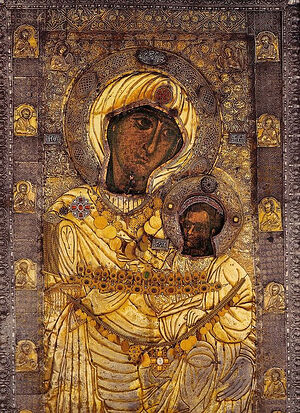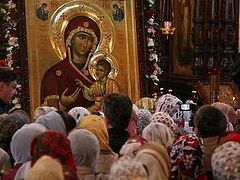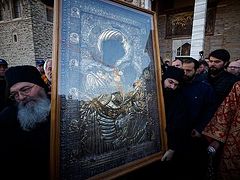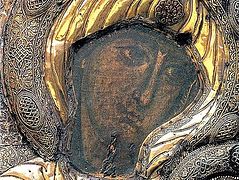 Brothers and sisters, our celebration is in honor of the holy icon of the Iveron Mother of God, which was first in the home of one pious widow in Nicea in the ninth century, during the years when holy icons were being persecuted under Emperor Theophilus. Powerless to save the holy icon from desecration, the widow set it out to sea, and it miraculously sailed toward the holy Mountain of Athos, which the Mother of God had chosen as her portion on earth along with Iberia. She had sent to Iberia the holy equal-to-the-apostles virgin Nina, the enlightener of Iberia. The Athonite monks saw a fiery pillar rising up over the holy icon, but they could not reach it. Then by a special revelation one monk from Iveron Monsastery, Gabriel, walked across the water and took the holy icon into his hands, then carried it to the church of the Iveron Monastery. But on the next day it was found over the monastery gates, where the Mother of God had chosen her abode.
Brothers and sisters, our celebration is in honor of the holy icon of the Iveron Mother of God, which was first in the home of one pious widow in Nicea in the ninth century, during the years when holy icons were being persecuted under Emperor Theophilus. Powerless to save the holy icon from desecration, the widow set it out to sea, and it miraculously sailed toward the holy Mountain of Athos, which the Mother of God had chosen as her portion on earth along with Iberia. She had sent to Iberia the holy equal-to-the-apostles virgin Nina, the enlightener of Iberia. The Athonite monks saw a fiery pillar rising up over the holy icon, but they could not reach it. Then by a special revelation one monk from Iveron Monsastery, Gabriel, walked across the water and took the holy icon into his hands, then carried it to the church of the Iveron Monastery. But on the next day it was found over the monastery gates, where the Mother of God had chosen her abode.
Several copies were made of this holy icon to be spread throughout the Russian land, and they became famous for their miraculous signs. One particularly remarkable copy is in the Iveron Valdai Monastery, brought there under the auspices of Patriarch Nikon who built that monastery. Then there are the copies in the Novodevichy Convent, and in the Iveron Chapel at the Resurrection Gates [to Red Square. —Trans.] in Moscow. Everyone knows how the Muscovites revere the holy Iveron icon as do all the pious sons of Russia, how thousands of pilgrims from tsars and tsarinas stream every day to the chapel to venerate the icon, how it is taken to people’s homes for molebens, and so on. One of these copies of the holy Iveron icon is the revered Mozdok icon of the Mother of God.
How wondrous was the appearance of the Iveron icon of the Mother of God, and how it reminds us of her wondrous protection of the human race! How her transport across the sea in a pillar of fire reminds us of when Israel traversed the Red Sea without drowning, led through the wilderness by a pillar of cloud and fire; and yet earlier, how God appeared to Moses in the burning bush, indicating first of all the people of Israel’s troubles in Egypt—that furnace of troubles in which God’s chosen people as if burned without being consumed, preserved by God’s power! This preservation of God’s people and their being led through the wilderness is not just some brief help and protection, but the whole education of a stiff-necked people—something much harder and more troublesome, requiring greater and more constant attention than, for example, what is demanded of a mother to bring up her child from diapers to where he stands on his own feet and attains the desires of his own life. To us, the new Israel of God (Gal. 6:16), the burning bush, the pillar of cloud and fire, Israel’s walk through the Red Sea, and other such things remind us of how the Mother of God guides us throughout our earthly sojourn in our traversing, instead of the Red Sea, another, “mental” sea of life’s passions, in which we can so easily be drowned by the “Pharaoh of the mind”—the devil. That is why we call the Mother of God the “Pillar of fire that guideth those in darkness” (Akathist to the Mother of God, Ikos 6).
We are also reminded that the “bush that burned yet was not consumed” is the Mother of God herself, who received God the Savior in her womb, “received the fire of the Divinity in her womb without being burned” (canon for Lazarus Saturday, irmos of the ninth ode); and why she is called the “bush that burned without being consumed” when, for example we sing in the church hymns, “Rejoice thou bush that burned but was not consumed!” We are reminded of how we also are delivered by the Mother of God from the furnace of troubles and passions, as Israel was delivered from the furnace of Egyptian sufferings, when we sing the hymn: Wherefore we now entreat Thee: quench the raging furnace of temptations that beset us (canon to the Resurrection, tone 1, irmos of ode nine). For often the flame of the passions is more dangerous than a material fire. Especially fleshly lust ignites a flame in a person’s soul and body; and only love for God, bedewing and helping extinguish the flame of lust, can put out this flame that is stronger than a material fire—just as the three holy youths’ love for God was stronger than the material fire in the Babylonian furnace; just as St. Martinian stood barefoot on the fire in order to put out the flame of lust ignited in his heart by a harlot who came to him in the guise of a pilgrim, but who later became a great ascetic with the name of Zoe. This is why the virginal bodies of the three Babylonian youths who conquered the flame of the passions through fasting (canon to the Resurrection, tone four, eighth ode), remained unconsumed in the Babylonian furnace. They were saved by what their standing in the furnace in their virginal bodies would prefigure—God the Savior’s abiding in the virginal womb of the Mother of God, who was not consumed by the fire of the Godhead.
Thus, the appearance of the Iveron icon reminds us of how the Mother of God preserves our entire lives. She as if guards all of our comings in and goings out, and is therefore called the “good gate-keeper, who openest the portal of paradise to the faithful” (Akathist to the Iveron icon of the Mother of God). She chose a place beneath the gates of the Iveron Monastery as if showing a sign that she wants to guard mankind’s comings in and goings out in life. So in Moscow does she as if guard the comings in and goings out of the Russian people who travel from all over to her in the “heart of Russia”, the capital city of Moscow. Also here in Vladikavkaz [where Hieromartyr Thaddeus was bishop.—Trans.], the very church built near the marketplace reminds us of how needful it is for people bustling about here to ever be signed with the blessing of good Gate-Keeper, the Mother of God, in all their comings and goings. May those who are so involved in the cares of life receive at least on this road a sign of the Protection of the Mother of God. If with all their daily burdens and worries or infirmities they are unable to come consistently and often to prayer, may they receive illumination of all life through this unceasing prayer.
But some may think: What benefit can there be from such a fleeting sign? Isn’t it the same as the breath of wind that touches a man and then disappears without a trace? No, even a brief heavenly overshadowing can bring a person great benefit. After all, how often does a person enter a church with one thought, but leave it with completely different ones! Need we recall St. Mary of Egypt, who went to Jerusalem with the intention of tempting pilgrims with lustful desires, and then after beholding the icon of the Most Holy Theotokos on the wall of the church, became a great ascetic, providing for all times and all generations of Christians an example of repentance and salvation from the abyss of ultimate destruction? So also at the icon of the Iveron Mother of God in Moscow have so many people, even unbelievers or those with wavering faith, been saved from ruinous decisions, their life paths changed, walking in by one path but leaving on another! Isn’t medicine taken in small doses, yet it has a curative effect on the whole body?
So shall we, brothers and sisters, scorched by the heat of life’s passions or crossing the sea of life, traversing the “wilderness of the passions”, receive more often the grace that comes from the icon of the Mother of God, as did Israel from the pillar of fire in the desert. This grace will guard us from many destructive errors in life. And although our hearts are often hardened against God and disobedient to Him, like the heart of Old Testament Israel, nevertheless the good Gate-Keeper can lead even us with her “strong arm” away from many destructive paths and bring us closer to heaven, just as God’s right arm led Israel closer to the promised land.
If only we would not completely distance ourselves from God and His Most Pure Mother by our endless voluntary straying toward the path of our depraved hearts; and when we hear His voice calling us to Himself, and the call of the good Gate-Keeper who opens the gates of paradise to us, may we not be hard-hearted like Israel in the days of its temptation in the wilderness, that we might not be barred entry into the promised land—that is, paradise—for our disobedience (cf. Eph. 3:7–19).



